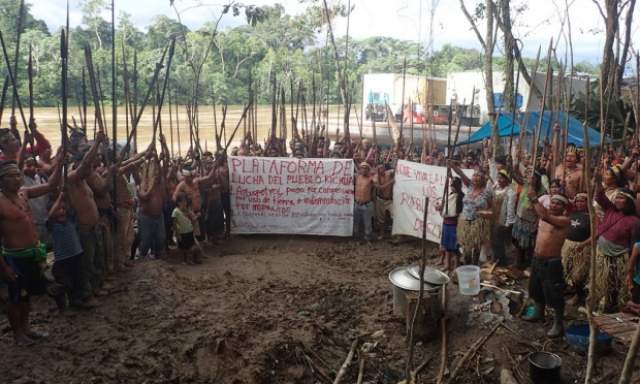Peru’s indigenous people protest against relicensing of oil concession

Kichwas protesting in the northern Peruvian Amazon following more than 40 years of oil operations in their territories. (Photo: Feconat / The Guardian)
Hundreds of indigenous people deep in the Peruvian Amazon are blocking a major Amazon tributary following what they say is the government’s failure to address a social and environmental crisis stemming from oil operations.
Kichwa men, women and children from numerous communities have been protesting along the River Tigre for almost a month, barring the river with cables and stopping oil company boats from passing.
Oil companies have operated in the region for over 40 years, and have been linked by local people to pollution that has led the government to declare “environmental emergencies” in the Tigre and other river basins.
“The Tigre is the most contaminated, but the government has done nothing serious,” says Jose Fachin, a Kichwa leader. “This is a protest by the whole Kichwa people. They’re ready to die for it. The price of oil is low, but the pain caused is extremely high.”
The oil concession where the protest is taking place, Lot 1-AB, is Peru’s most productive, but the contract, held by Pluspetrol, expires in August. The government has committed to relicensing it and consulting the indigenous communities involved, but leaders say the contamination and other issues must be addressed first.
“What we want is remediation, compensation, and to be consulted, according to international norms, about the relicensing,” says Fachin. “We won’t permit another 30 years of work otherwise.”
The Kichwas are protesting in a community called Nuevo Remanente. The community’s head, Ronal Chuje Sandi, told the Guardian two years of dialogue with the government “hasn’t achieved anything” and now they are demanding 100 million Peruvian nuevo soles, from Pluspetrol, for “compensation after almost 45 years of contamination.”
“The state declared an environmental emergency, but hasn’t done anything,” says Guillermo Sandi Tuituy, from indigenous federation Feconat. “It must find a solution to this problem if it wants to relicense the concession.”
Hundreds of other indigenous people are also protesting in Lot 1-AB along an adjacent river, the Corrientes. According to Puinamudt, a collective of indigenous federations, 400 Achuar from a community called Pampa Hermosa have protested for over a week, paralysing operations at 19 wells and shutting down one field.
Achuar leader Carlos Sandi, president of indigenous federation Feconaco, says they will not allow Lot 1-AB to be relicensed if their demands are not met. Pluspetrol’s partner in Lot 1-AB, which accounted for almost 25% of Peruvian oil production in 2013, is the China National Petroleum Corporation.
Raul Sosa Rodriguez, from Feconaco, told the Guardian that Pampa Hermosa is demanding compensation for land use, fulfilment of an agreement with Pluspetrol, and the opportunity to work for sub-contractors, in addition to existing demands such as clean-up.
“This is a lever to propel the fight for all the indigenous peoples in the region,” he says. “If these demands aren’t met, they’ll close the concession.”
Anthropologist Alberto Chirif says the government is determined to relicense Lot 1-AB.
“What the indigenous people are asking for isn’t difficult to satisfy,” he says. “These are basic rights: territory, health, education, the clean-up of impacted areas, and control so there are no new environmental disasters.”
Peru’s council of ministers (PCM) issued a statement saying it has sent a commission to the region and urging the Kichwas and Achuars to suspend their protests.
Pluspetrol took over Lot 1-AB from Occidental in 2000. It did not respond to requests for comment.
Source: The Guardian
Related Project:

Territories of Life
The Territories of Life toolkit is a series of 10 short videos that share stories of resistance, resilience and hope with communities on the front-line of the global rush for land. These videos, available in English, Spanish, French, Indonesian and Swalhili and are currently being disseminated widely by community facilitators.
Categories
Latest news
- LifeMosaic’s latest film now available in 8 languages
- การเผชิญหน้ากับการสูญพันธุ์ และการปกป้องวิถีชีวิต (Thai)
- LANÇAMENTO DO FILME BRASIL : Enfrentando a Extinção, Defendendo a Vida
- Enfrentando la Extinción, Defendiendo la Vida (Español)
- Peluncuran video baru dalam Bahasa Indonesia : Menghadapi Kepunahan, Mempertahankan Kehidupan


